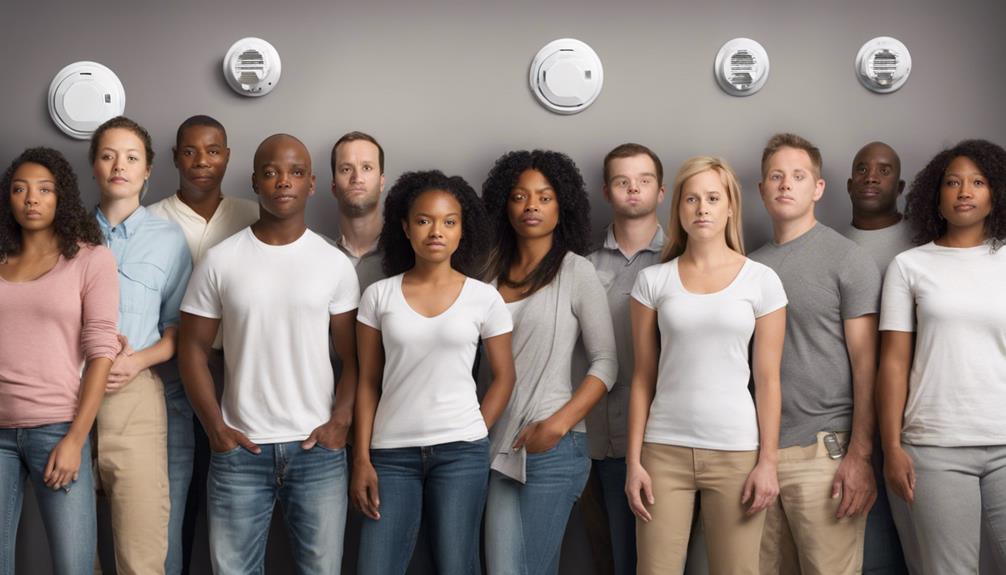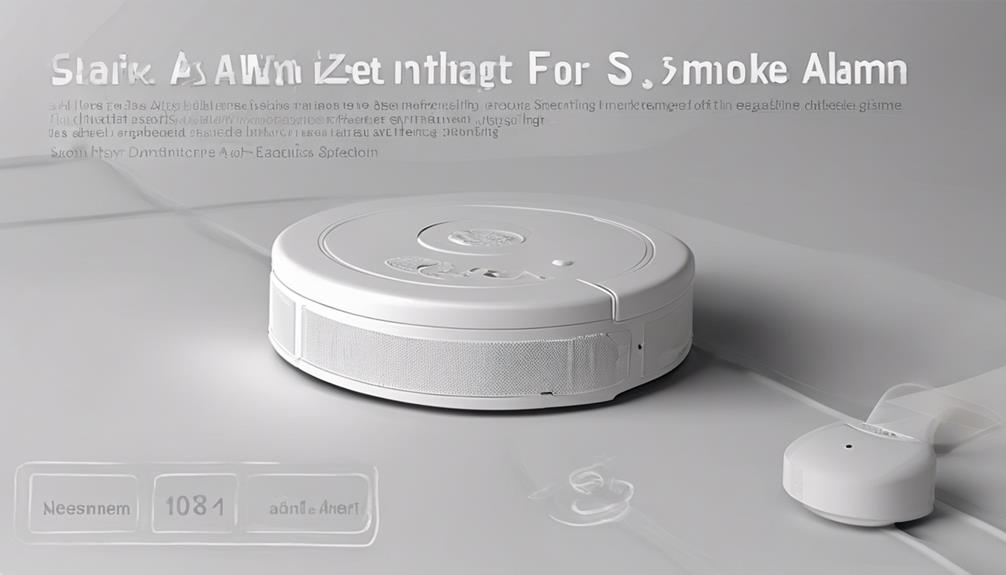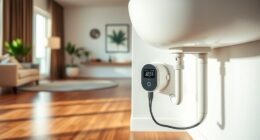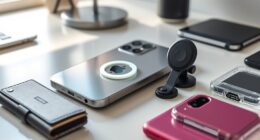When choosing a smoke alarm for individuals who are deaf, it can feel daunting due to the many options on the market. However, do not worry, as we will make this important decision easier by highlighting essential features and factors that are crucial for keeping people with hearing impairments safe.
By understanding the unique requirements and functionalities of deaf-friendly smoke detectors, you can make a well-informed choice to safeguard against potential emergencies effectively.
Key Takeaways
- Opt for smoke detectors with high-intensity strobe lights for visual alerts.
- Choose interconnected alarms for comprehensive coverage in different areas.
- Prioritize detectors with photoelectric and carbon monoxide sensors for dual protection.
- Select ADA and UL STD 1971 compliant detectors with LED strobe lights for effective alertness.
Importance of Smoke Detectors for Deaf
Ensuring the safety of deaf individuals in the event of a fire necessitates the installation of specialized smoke detectors equipped with visual alert features. Standard smoke detectors that rely on auditory alarms may not effectively alert individuals with hearing impairments. Alarms with strobe lights are recommended for the deaf to provide visual cues in case of a fire emergency. Specifically, high-intensity strobe lights in alarms, especially in sleeping areas, are crucial to waking individuals who mightn't hear traditional alarm sounds.
It is essential to choose smoke detectors that meet ADA requirements and UL Standards for the deaf community. These detectors are designed to comply with regulations that ensure accessibility and safety for individuals with disabilities. By incorporating visual alert features such as strobe lights, smoke detectors can effectively notify deaf individuals of potential fire hazards, enabling them to respond promptly and evacuate safely. When selecting a smoke detector for the deaf, prioritizing models that cater to their specific needs is paramount for overall safety and peace of mind.
Types of Deaf-Friendly Smoke Detectors
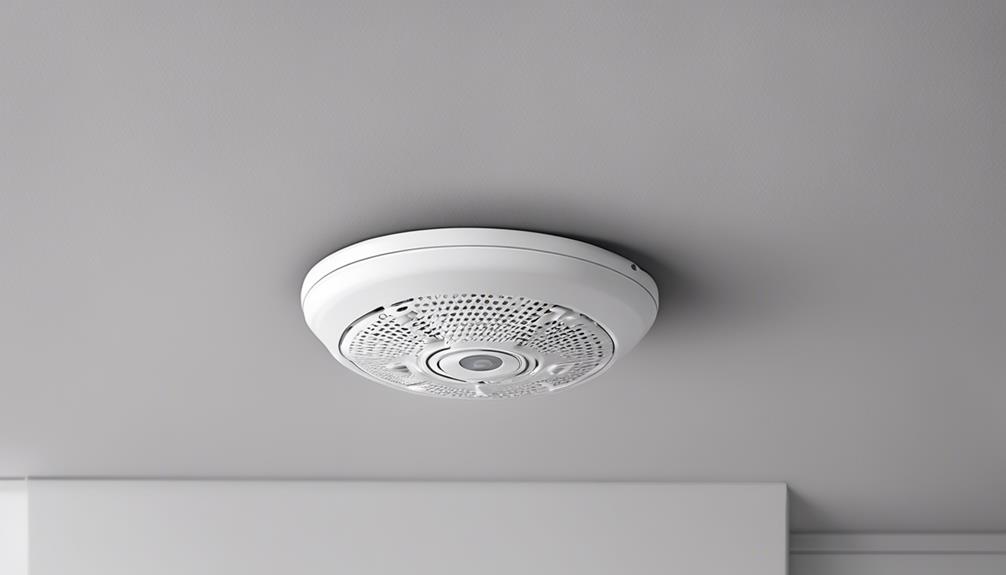
Visual alert systems, such as strobe light alarms, offer deaf individuals a clear warning through flashing lights.
Vibrating alarm options, like bed or pillow shakers, provide a physical stimulus to wake up those with profound hearing loss.
Combining these features can create a comprehensive alert system tailored to the specific needs of individuals who are deaf or hard of hearing.
Visual Alert Systems
Incorporating high-intensity strobe lights and LED displays into smoke detectors enhances alert effectiveness for individuals with hearing loss. Strobe lights, emitting powerful flashing lights, and LED displays, providing visual alerts for smoke and fire detection, are key components of deaf-friendly smoke detectors.
These visual alert systems play a crucial role in ensuring timely responses to emergencies by offering customizable visual alerts tailored to different preferences and needs. By utilizing advanced technology like strobe lights and LED displays, these smoke detectors offer innovative solutions for individuals with hearing loss, improving overall safety and peace of mind.
Choosing a smoke detector with visual alert systems is essential for creating a secure environment that caters to the specific requirements of those with hearing impairments.
Vibrating Alarm Options
Highlighting another critical feature of deaf-friendly smoke detectors, vibrating alarm options cater specifically to individuals with hearing loss by providing a reliable alert system designed to wake them during emergencies.
These alarms use vibrations to ensure individuals are promptly notified of smoke or fire dangers, making them essential safety devices for the deaf or hard-of-hearing. Ideal for deep sleepers and those with profound hearing loss, vibrating alarms offer an effective way to enhance safety in homes.
Some models can even be interconnected with other safety devices to create a comprehensive alert system. By incorporating vibrating alarm options into their homes, individuals with hearing loss can rest assured that they'll be alerted in case of emergency situations, improving overall safety and peace of mind.
Considerations for Smoke Detector Selection
When selecting a smoke detector for the deaf, it's crucial to consider various factors to ensure optimal safety and protection.
- Opt for smoke detectors with high-intensity strobe lights, as recommended by ADA and UL Standards, to provide visual alerts for individuals with hearing impairments.
- Look for interconnected alarms to establish a personalized home safety system that offers comprehensive coverage throughout your living space.
- Choose smoke detectors equipped with both photoelectric sensors for smoke detection and carbon monoxide sensors to provide dual protection against different types of hazards.
- Ensure the smoke detector undergoes testing by independent laboratories to meet the stringent requirements of ADA and UL STD 1971 standards, guaranteeing reliability and performance.
- Select smoke detectors featuring LED strobe lights, particularly beneficial in sleeping areas, to ensure effective alertness through visual notifications.
Considering these factors will help you make an informed decision when choosing a smoke detector tailored to the needs of the deaf community.
Key Features to Look For
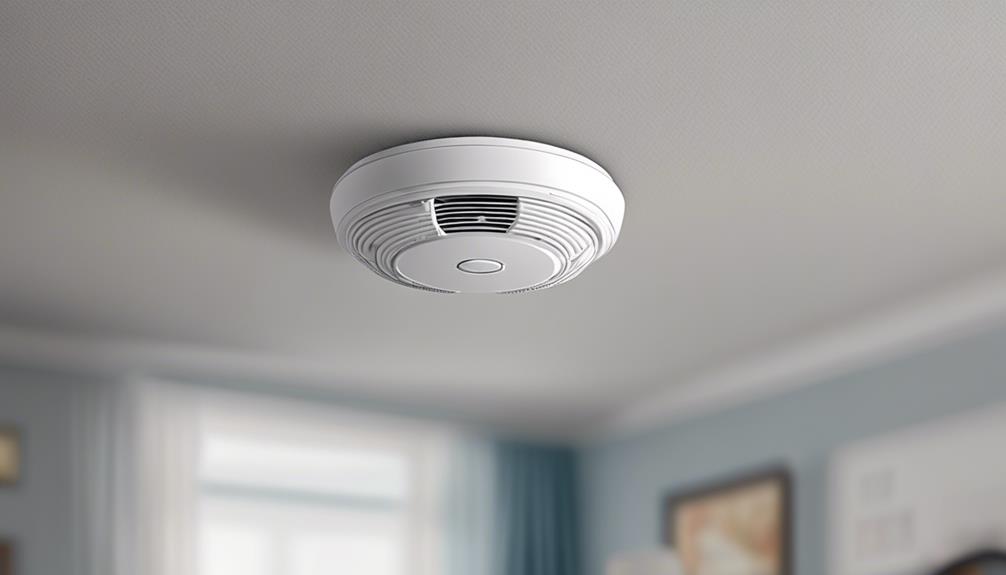
When selecting a smoke detector for the deaf, it's crucial to prioritize features like high-intensity strobe lights for effective visual alerts.
Additionally, exploring options that include vibration alerts can provide an extra layer of notification for those who are hard of hearing.
These key features play a significant role in ensuring the safety of individuals with hearing impairments in the event of a fire emergency.
Visual Alerts Importance
In selecting a smoke detector for the deaf, it's imperative to prioritize visual alerts as they play a critical role in alerting individuals who rely on flashing lights to indicate potential dangers. When considering smoke detectors for deaf individuals, key features to look for include:
- High-intensity strobe lights that effectively alert deaf individuals to smoke or fire emergencies.
- Recommendations from organizations like the NFPA for smoke detectors with visual alerts for the deaf or hard-of-hearing.
- Essential safety features provided by visual alerts in smoke detectors, especially in sleeping areas.
- ADA certification ensuring specific standards are met for the safety of deaf or hard-of-hearing individuals.
- Compliance with regulations ensuring the effectiveness of visual alerts in smoke detectors for the deaf community.
Vibration Alert Options
Visual alerts are crucial for deaf individuals in smoke detectors. When considering vibration alert options, key features to look for include customizable vibration intensity levels. These options provide tactile alerts that are essential for ensuring the safety and awareness of individuals who rely on non-auditory notifications.
The ability to adjust the vibration intensity allows for personalized alerts that are effective in waking individuals during smoke or fire events. By incorporating vibration alert options with adjustable settings, smoke detectors can enhance their functionality for the deaf community, offering a reliable way to alert individuals without relying on sound.
These features contribute significantly to the overall effectiveness of smoke detectors in providing timely notifications to ensure the safety of deaf individuals.
Benefits of Strobe Lights
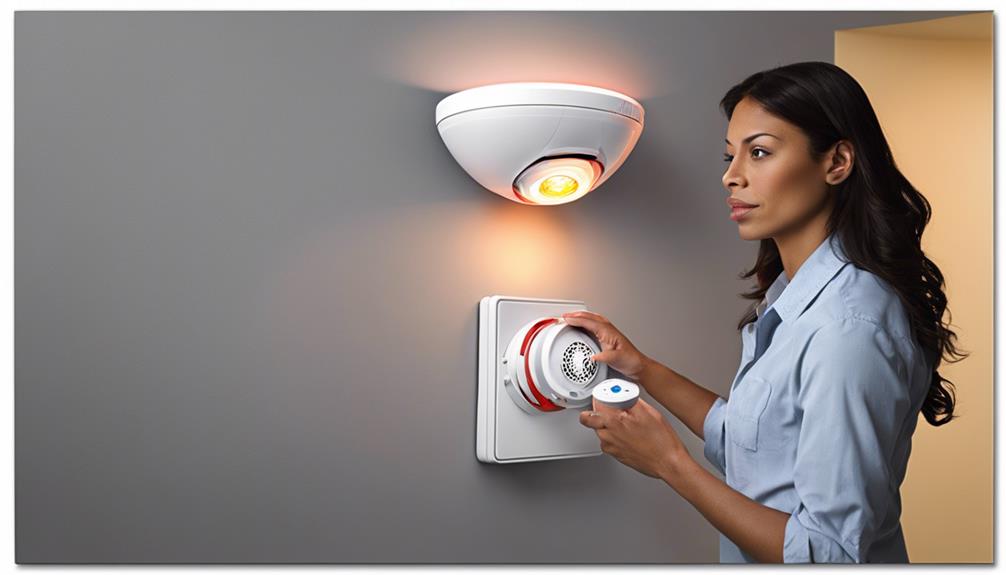
To ensure immediate alertness for deaf individuals during emergencies, the high-intensity strobe lights incorporated in alarms play a crucial role. These lights are specifically designed to grab attention quickly and effectively, providing essential safety benefits for those who are unable to hear standard alarms.
Here are some key benefits of strobe lights in smoke detectors for the deaf:
- Quick Alertness: Strobe lights flash brightly, ensuring individuals are promptly alerted to emergencies even while sleeping.
- ADA Compliance: Alarms with strobe lights meet ADA requirements, making them a reliable choice for ensuring accessibility and safety for all.
- UL Standards: Strobe lights in alarms adhere to UL Standards, guaranteeing their effectiveness in alerting to smoke, fire, or carbon monoxide presence.
- Enhanced Safety: Strobe lights significantly improve the safety of deaf individuals by providing visual alerts in addition to sound-based alarms.
- Customization: Some strobe lights can be customized with different patterns or colors, offering personalized alert options for users.
Vibrating Smoke Detectors Explained
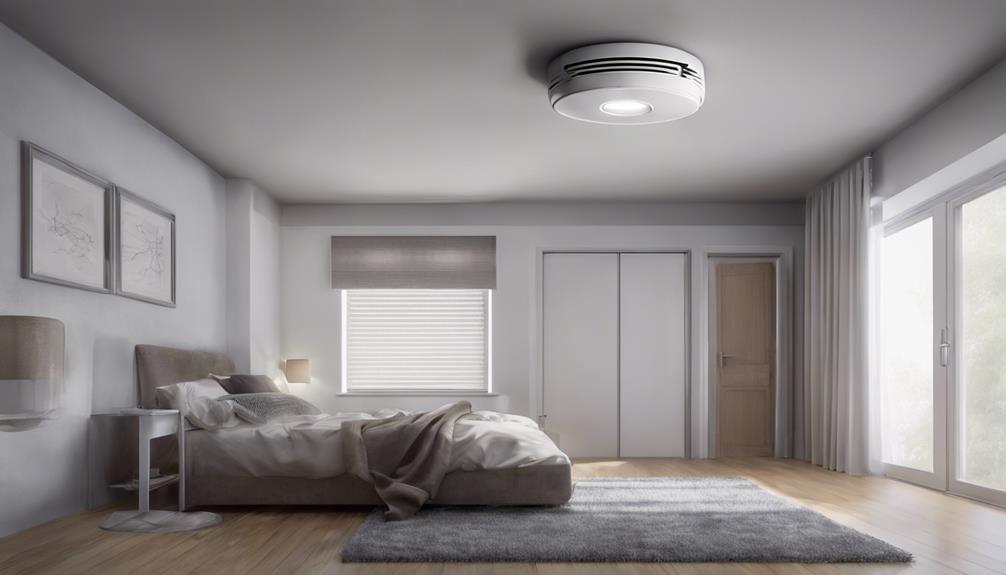
Vibrating smoke detectors utilize tactile alerts to awaken individuals with hearing impairments during emergencies. These alarms are engineered to vibrate forcefully, ensuring that even those who are asleep or have limited hearing capabilities are promptly notified.
The vibrating feature is a key aspect of these detectors, offering a crucial accessibility feature for the deaf community in times of crisis.
Vibration for Notification
Utilizing advanced vibration technology, smoke detectors designed for the deaf provide a reliable means of alerting individuals with hearing loss to potential fire hazards. These detectors are specifically engineered for those who may not hear traditional audible alarms. Here are some key points about vibration for notification:
- Vibrating smoke detectors utilize vibration to alert individuals with hearing loss to potential fire hazards.
- The vibration from these detectors is strong enough to wake individuals from sleep in case of emergencies.
- They're ideal for heavy sleepers, older adults, and individuals with profound hearing loss.
- These detectors offer an effective and reliable means of notification for the deaf and hard-of-hearing.
- Vibration technology in smoke detectors enhances safety measures in emergencies.
Deaf Accessibility Feature
How can vibrating smoke detectors with deaf accessibility features enhance safety for individuals with hearing loss? Vibrating smoke detectors offer a crucial tactile alert signal for deaf individuals, ensuring they are promptly alerted to potential dangers like smoke or fire. These detectors use physical vibration to wake up individuals during emergencies, providing a reliable warning system specifically designed for those with hearing impairments. The vibrating alarms are effective for heavy sleepers and individuals who may not be awakened by traditional auditory alarms. By incorporating vibrating smoke detectors into their safety measures, deaf individuals can significantly enhance their safety and security in the event of a fire or smoke-related incident.
| Feature | Description |
|---|---|
| Tactile Alert Signal | Provides physical vibration to wake up individuals with hearing loss during emergencies |
| Target Audience | Deaf individuals, heavy sleepers, those not awakened by auditory alarms |
| Purpose | Enhance safety and security by ensuring prompt alerts for smoke and fire detection |
Integration With Home Alarm Systems
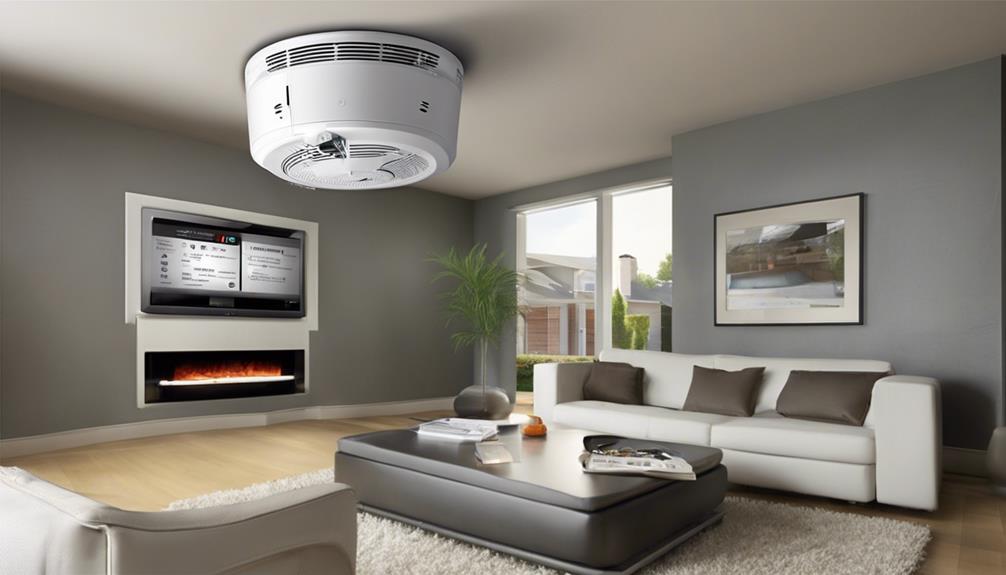
When integrating First Alert's hearing impaired LED strobe lights with hardwired alarms, homeowners can create a customized safety system that enhances overall home protection. These LED strobe lights, designed to meet ADA requirements and UL Standards, offer a valuable addition to traditional alarms, providing visual alerts for individuals who are deaf or hard of hearing.
Here are five key points to consider when integrating these devices into your home alarm system:
- Enhanced Safety: The integration of LED strobe lights with hardwired alarms increases the overall safety of your home by providing visual alerts for smoke, fire, and carbon monoxide presence.
- Versatility: These strobe lights are ideal for areas without traditional alarms, such as garages, ensuring comprehensive coverage throughout your property.
- Customization: Integration with home alarm systems allows for customization, tailoring alerts and notifications to suit your specific needs.
- Interconnected Feature: The interconnected feature of First Alert alarms creates a safety network that ensures all areas of your home are covered in case of emergencies.
- Reliability: Using First Alert alarms meeting ADA requirements guarantees reliable safety devices that adhere to industry standards for peace of mind.
Wireless Connectivity Options

Wireless connectivity options in smoke detectors enable seamless communication between devices without the need for hardwiring, ensuring synchronized alerts throughout the home during emergencies.
These interconnected alarms use wireless technology to sound simultaneously when one detects smoke or fire, providing comprehensive coverage.
Wireless smoke detectors offer flexibility in installation locations, allowing homeowners to place them where they're most effective. The communication between these devices is reliable, ensuring that all areas of the house are covered.
Additionally, wireless smoke detectors can be easily expanded or upgraded to adapt to changing safety needs, making them a versatile choice for households. This technology not only enhances the overall safety of the home but also provides convenience and peace of mind.
Maintenance and Testing Guidelines
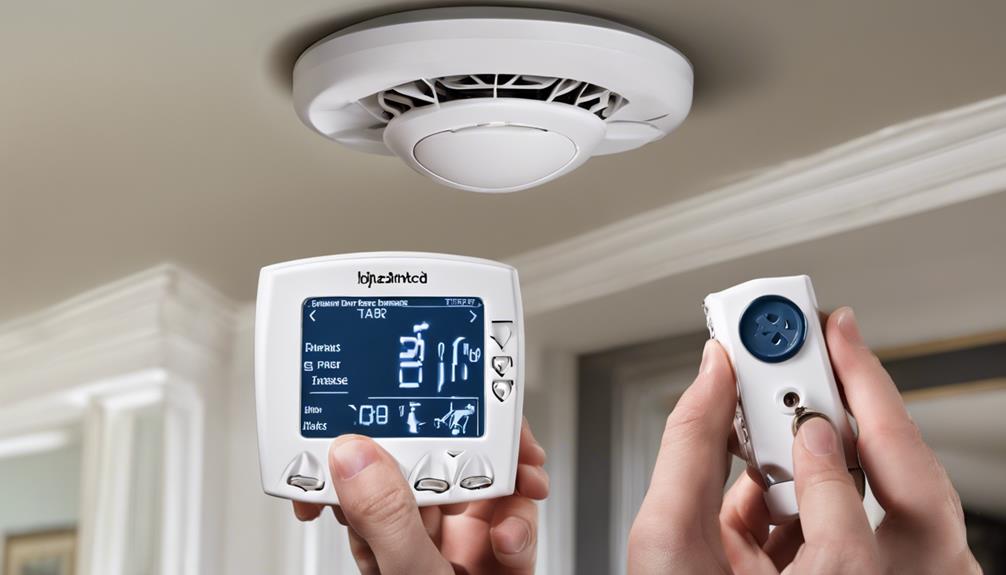
Regularly testing and maintaining your smoke detector is essential to ensure its proper functionality and effectiveness in detecting smoke or fire emergencies. When it comes to maintaining and testing your smoke alarm, here are some important guidelines to follow:
- Test Monthly: Test your smoke detector at least once a month to confirm it's working correctly.
- Replace Batteries Annually: Ensure to replace the batteries in your smoke detector at least once a year to uphold its effectiveness.
- Follow Manufacturer's Guidelines: Adhere to the manufacturer's guidelines for maintenance and testing to keep your smoke detector in optimal condition.
- Clean Regularly: Regularly clean your smoke detector to prevent dust and debris from impeding its performance.
- Consider 10-Year Battery: Consider investing in a smoke detector with a sealed 10-year battery to minimize maintenance needs.
Emergency Response Preparation

To ensure optimal emergency preparedness, establishing a comprehensive safety plan that includes visual alerts and vibrating devices can significantly enhance the response for individuals who are deaf. It's crucial to practice emergency evacuation drills regularly to familiarize everyone with the procedures in case of a fire or other emergencies. Keeping emergency contact numbers, such as the local fire department, easily accessible is essential for quick assistance. Creating a safety plan that outlines escape routes and designated meeting points for family members ensures coordination during evacuations.
Incorporating visual alerts alongside the standard smoke alarm system can provide crucial visual cues for deaf individuals in the event of an emergency. Additionally, using vibrating devices like bed shakers or wearable alert systems can further enhance the ability to receive alerts promptly. Staying informed about local emergency protocols and available resources for individuals with hearing impairments is also key to effective emergency response. By following these practices and utilizing innovative technologies, individuals who are deaf can be better prepared to respond to emergencies.
Comparison of Popular Brands
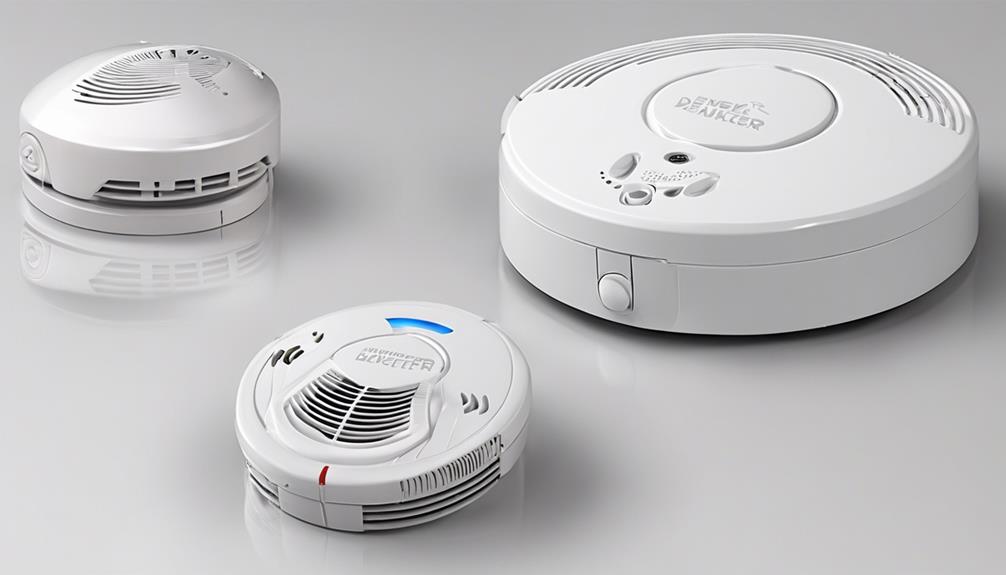
When comparing popular brands for smoke detectors tailored to the needs of the deaf and hard-of-hearing, it's essential to consider features such as LED strobe lights, interconnected visual, auditory, and tactile alerts, and dual protection for smoke and carbon monoxide detection. Some key points to consider are:
- First Alert: Offers ADA certified smoke alarms with LED strobe lights, ensuring compliance and visibility for the hard-of-hearing.
- National Fire Protection Association: Recommends alarms with high-intensity strobe lights for effective alerting.
- Bellman & Symfon and Silent Call: Provide interconnected systems with a range of alerts, catering to various sensory needs for fire notification.
- First Alert's Hardwired Alarms: Combine LED strobe lights with smoke and carbon monoxide detection for comprehensive safety.
- ReSound Nexia and Starkey Genesis AI: Hearing aid brands offering significant savings, enhancing accessibility for the hard-of-hearing community.
These features highlight the advancements in smoke alarm technology, ensuring safety and peace of mind for individuals with hearing impairments.
User-Friendly Installation Tips
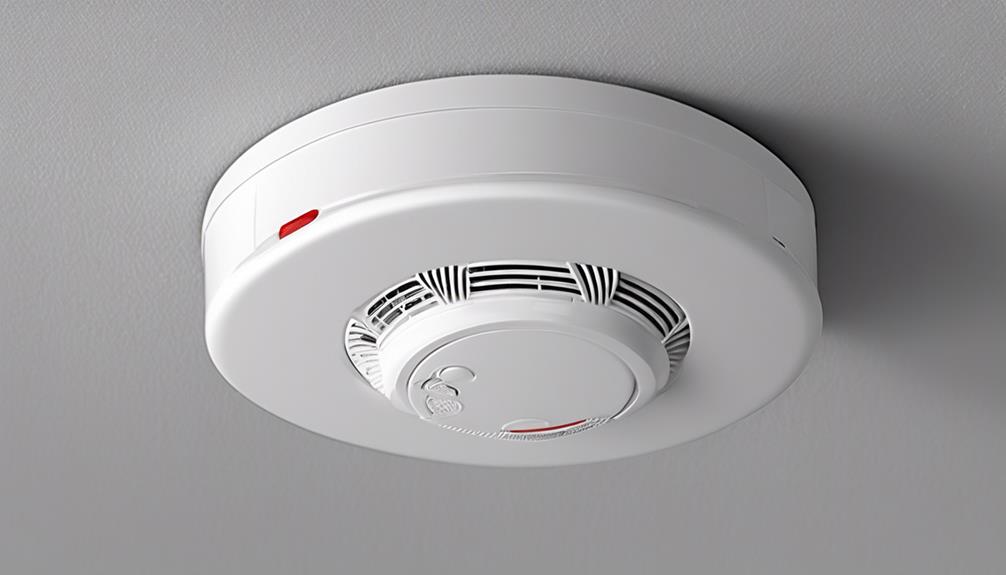
For user-friendly installation of smoke detectors tailored to the needs of the deaf, prioritize selecting models equipped with visual alerts like strobe lights. These high-intensity flashing lights are essential for effectively alerting individuals who are deaf or hard of hearing in the event of a fire emergency. Additionally, choosing interconnected smoke detectors can create a comprehensive safety system in your home, ensuring that all areas are adequately covered. When installing these devices, it is crucial to place them strategically in key locations such as bedrooms and living areas to maximize coverage and provide early detection of smoke or fire.
| Installation Tips | Description |
|---|---|
| Visual Alerts | Opt for smoke detectors with strobe lights for effective visual notifications. |
| Interconnected Detectors | Create a network of smoke detectors that communicate with each other for enhanced safety. |
| Strategic Placement | Install detectors in crucial areas like bedrooms and living rooms for comprehensive coverage. |
| Regular Testing | Test the smoke detectors frequently to ensure proper functioning and reliability. |
| High-Intensity Lights | Choose models with high-intensity flashing lights to alert deaf individuals promptly. |
Ensuring Long-Term Reliability
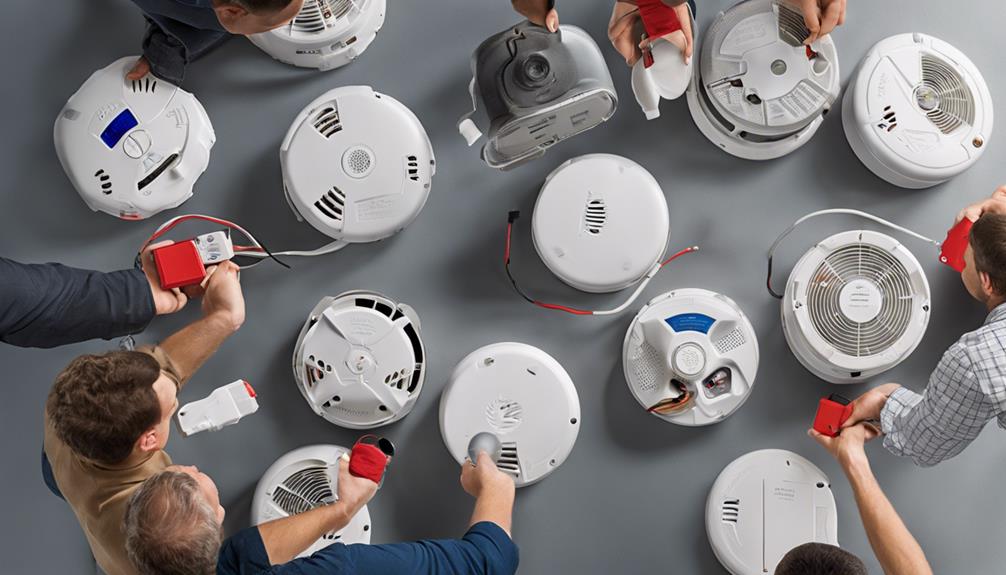
Ensuring long-term reliability in smoke detectors for the deaf involves prioritizing models with durable batteries, hardwired connections, and self-testing capabilities to maintain continuous and dependable operation.
- Long-lasting Batteries: Choose smoke detectors with batteries that have a reputation for longevity to avoid frequent replacements.
- Hardwired Smoke Detectors: Opt for hardwired smoke alarms for a reliable power source that ensures consistent functionality.
- Self-testing Features: Look for smoke detectors equipped with self-testing capabilities to verify proper operation regularly without manual intervention.
- Interconnected Smoke Alarms: Consider interconnected smoke detectors for enhanced safety, allowing alerts to be heard throughout the entire home.
- Proven Durability and Reliability: Select smoke detectors with a track record of durability to guarantee long-term protection and peace of mind.
Frequently Asked Questions
How Do I Know What Smoke Detector I Need?
When selecting a smoke detector, consider factors like the individual's hearing ability and sleep patterns.
We recommend detectors with high-intensity strobe lights for the deaf or hard-of-hearing.
Interconnected alarms enhance safety by linking to other devices. Opt for models with smoke and carbon monoxide detection for comprehensive protection.
Ensure the device meets ADA requirements and UL standards for reliability. These features provide advanced safety for all users.
Is There a Vibrating Fire Alarm for the Deaf for Guests at Hotels?
Absolutely, there are vibrating fire alarms for the deaf in hotels. These alarms use vibrations to alert individuals who may not hear traditional alarms.
They're crucial safety tools that ensure deaf guests are promptly notified during emergencies. By installing these devices, hotels can provide a safer environment for guests with hearing impairments.
It's a smart and compassionate choice to prioritize the safety and well-being of all guests.
Are Smoke Detectors of No Value for People Who Are Deaf or With Hearing Difficulties?
Smoke detectors hold value for individuals who are deaf or have hearing difficulties. Strobe lights in these detectors effectively alert them to potential fire hazards. Specialized models provide visual notifications, enhancing safety by ensuring they're aware of smoke or fire.
These devices are crucial for alerting individuals with hearing difficulties to fire emergencies. Visual alerts play a vital role in keeping the deaf informed about potential dangers in their environment.
What Are the 3 Types of Smoke Detectors?
We've three main types of smoke detectors: ionization, photoelectric, and dual-sensor alarms.
Ionization detectors excel at fast-flaming fires, while photoelectric alarms are more sensitive to smoldering fires.
Dual-sensor smoke alarms combine both sensors for comprehensive fire detection.
Each type has its own strengths and weaknesses in detecting fires. Choosing the right one depends on individual needs and home layout.
Can a Smoke Detector for the Deaf Also Detect Carbon Monoxide?
Yes, a carbon monoxide detector for deaf individuals exists. This device uses a combination of flashing lights, vibrations, and loud alarms to alert deaf and hard-of-hearing individuals to the presence of carbon monoxide. It ensures that everyone, regardless of hearing ability, can stay safe from this silent, but deadly, gas.
Conclusion
In conclusion, when it comes to choosing a smoke detector for the deaf, it's crucial to prioritize safety and reliability. Remember the saying, 'Better safe than sorry.'
By selecting a high-intensity strobe light alarm that's specifically designed for individuals with hearing impairments, you can ensure that emergency alerts are effectively communicated.
Investing in a deaf-friendly smoke detector is a proactive step towards protecting yourself and your loved ones from potential dangers.
Stay safe and be prepared for any emergency situation.

